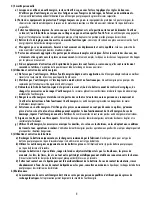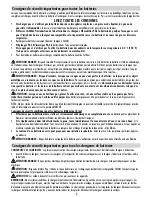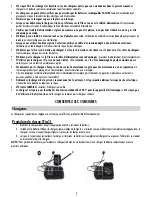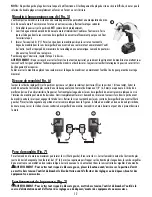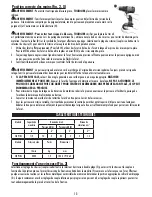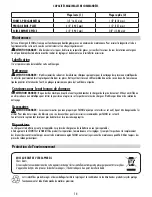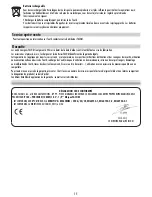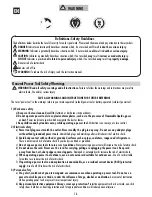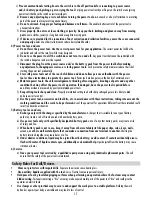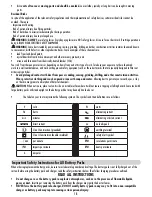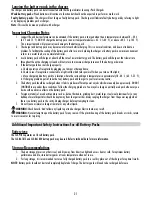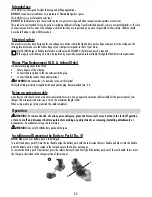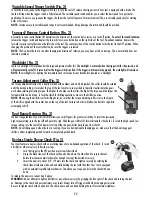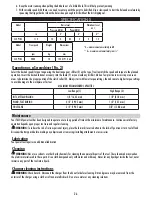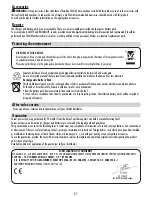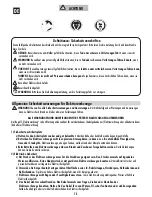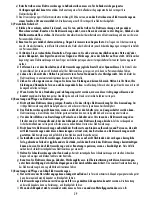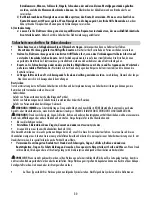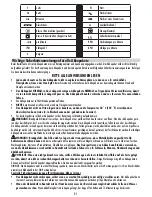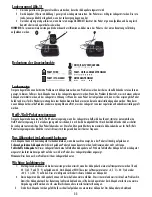
18
•
Air vents often cover moving parts and should be avoided.
Loose clothes, jewelry or long hair can be caught in moving
parts.
Residual Risks
In spite of the application of the relevant safety regulations and the implementation of safety devices, certain residual risks cannot be
avoided. These are :
- Impairment of hearing.
- Risk of personal injury due flying particles;
- Risk of burns due to accessories becoming hot during operation.
- Risk of personal injury due to prolonged use.
WARNING: ALWAYS
use safety glasses. Everyday eyeglasses are NOT safety glasses. Also use face or dust mask if cutting operation is
dusty. ALWAYS WEAR CERTIFIED SAFETY EQUIPMENT.
WARNING
: Some dust created by power sanding, sawing, grinding, drilling, and other construction activities contains chemicals known
to cause cancer, birth defects or other reproductive harm. Some examples of these chemicals are:
• lead from lead-based paints,
• crystalline silica from bricks and cement and other masonry products, and
• arsenic and chromium from chemically-treated lumber (CCA).
Your risk from these exposures varies, depending on how often you do this type of work. To reduce your exposure to these chemicals:
work in a well ventilated area, and work with approved safety equipment, such as those dust masks that are specially designed to filter out
microscopic particles.
•
Avoid prolonged contact with dust from power sanding, sawing, grinding, drilling, and other construction activities.
Wear protective clothing and wash exposed areas with soap and water.
Allowing dust to get into your mouth, eyes, or lay
on the skin may promote absorption of harmful chemicals.
CAUTION:
When not in use, place tool on its side on a stable surface where it will not cause a tripping or falling hazard. Some tools with
large battery packs will stand upright on the battery pack but may be easily knocked over.
•
The label on your tool may include the following symbols. The symbols and their definitions are as follows:
Important Safety Instructions for All Battery Packs
When ordering replacement battery packs, be sure to include catalog number and voltage. The battery pack is not fully charged out of the
carton. Before using the battery pack and charger, read the safety instructions below. Then follow charging procedures outlined.
READ ALL INSTRUCTIONS
•
Do not charge or use the battery pack in explosive atmospheres, such as in the presence of flammable liquids,
gases or dust.
Inserting or removing the battery pack from the charger may ignite the dust or fumes.
•
NEVER force the battery pack into charger. DO NOT modify battery pack in any way to fit into a non-compatible
charger as battery pack may rupture causing serious personal injury.
V
volts
W
watts
Hz
hertz
alternating current
min
minutes
alternating or direct current
direct current
no
no load speed
Class I Construction (grounded)
earthing terminal
Class II Construction (double insulated)
safety alert symbol
…/min
per minute
RPM
revolutions per minute
IPM
impacts per minute
BPM
beats per minute
A
amperes
Summary of Contents for CL3.P18S
Page 117: ...117 1 2 RCD RCD EL...
Page 118: ...118 3 off on 4 5...
Page 119: ...119 6 CCA V W watt Hz hertz min no I I min RPM IPM BPM A...
Page 120: ...120 FACOM 40 C 105 F on li ion 15 FACOM...
Page 121: ...121 FACOM 2 230V 1 1 2 H 1 3 H...
Page 122: ...122 1 18 24 C 65 F 75 F 4 5 C 40 F 40 5 C 105 F 2 3 4 18 24 C 65 F 75 F 5 6...
Page 124: ...124 FACOM EN 60335 FACOM 3A 1mm2 30 FACOM D C A F 2 E B G H E I...
Page 125: ...125 4 H G 2 A 2 B OFF 2 C D 20 3 D 3 E 4 H G D E 3...
Page 126: ...126 5 1 OFF 2 3 19 3 4 2 OFF 6 D E 1 6 4 1 4 Torx 6 7 6 4 1 4 off off 5 6 7 E D E D...
Page 142: ...142 CL3 BA1830 CL3 CH1018...

